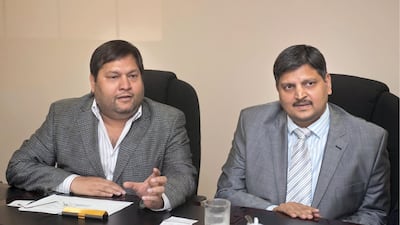An extradition treaty signed between the UAE and South Africa could signal the start of proceedings to see the Gupta brothers facing corruption charges ejected from Dubai to stand trial.
The three Indian-born brothers, Ajay, Atul and Rajesh, stand accused of using close ties with former president Jacob Zuma to strip billions of rand from government assets.
The men have been sighted in India and Dubai in recent months, and could now be subject to the new legal assistance agreements signed by Sultan Al Dhaheri, UAE Minister of Justice, and Michael Masutha, Minister of Justice and Correctional Services of South Africa.
“These agreements will promote judicial and legal sector cooperation, in the best interest of the two friendly nations,” said Mr Masutha.
The new treaty and legal agreements are the result of lengthy talks between the two countries, first reported in May.
An arrest warrant was issued by police in South Africa for Ajay Gupta in relation to a corruption case.
Atul and Rajesh have both been given South African citizenship.
_______________
Read more:
End of the line for South Africa's Gupta family
South Africa in talks with UAE over repatriating Gupta brothers
Gupta brothers denied video testimony request
_______________
The men, who are believed to own property and businesses in Dubai, are also accused of inappropriately influencing cabinet appointments in South Africa, known as state capture.
Natasha Mazzone, the South African Democratic Alliance shadow minister on state companies, told Reuters that the Guptas will have to answer to the allegations in front of them, and backed the new treaty.
"This means the infamous Guptas are fast running out of places to hide as they can now face extradition to finally answer for state capture," she said.
The Guptas have close business ties with Zuma’s son, Duduzane Zuma, and stand accused of using their political connections to award state contracts.
The brothers, all in their 40s, moved from the northern state of Utta Pradesh in India to South Africa in 1993 in the wake of the country’s civil rights revolution.
A family business, Sahara Computers was soon established to elevate the Guptas to one of the richest families in the country within two decades.
By 2016, Atul Gupta was reported to have an estimated wealth of $773.47 million (Dh2.8 billion).
The Guptas fled South Africa shortly after Zuma finally resigned from the presidency in February.
The South African justice department would not comment on individual cases or confirm if the Guptas would now be forcibly returned to face action in South Africa.
Both parties have repeatedly denied wrongdoing, and could not be reached for comment.

